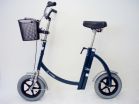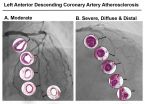(Press-News.org) Scientists with the University of Mississippi Medical Center (UMMC) and colleagues found that very small brain lesions noted on brain imaging that would typically be disregarded by clinicians are associated with a heightened risk of stroke and death. The findings are in today's (July 7, 2015) Annals of Internal Medicine.
The discovery about these tiny lesions -- areas of the brain where tissue may have been damaged by injury or disease -- may help physicians identify people at risk of stroke and death as early as middle age, even when they are displaying no symptoms of cardiovascular disease.
"The lesions on the brain imaging were very small, less than 3 millimeters, and are typically ignored in clinical practice," said lead study author Dr. Gwen Windham, an associate professor of internal medicine and geriatrics at UMMC. "This is because we have been uncertain as to their meaning; no studies have looked to see if these very small lesions are related to important clinical outcomes. Our findings suggest they are at least as important as 3 millimeter or larger lesions that are typically considered abnormal, even in absence of other lesions."
The researchers analyzed brain magnetic resonance imaging (MRI) data from nearly 1,900 individuals participating in the Atherosclerosis Risk in Communities (ARIC) Study who were 50 to 73 years of age with no prior history of stroke, tracking their health over about 15 years.
Risk of stroke or stroke mortality in people with small lesions was three times greater compared with people with no lesions. People with both very small and larger lesions had seven to eight times higher risk of these poor outcomes.
"Some of these lesions are so small they have the resolution of a single pixel," said Dr. Thomas Mosley, director of the Memory Impairment and Neurodegenerative Dementia (MIND) Center at UMMC and senior scientist on the study. "In clinical practice, we would typically ignore these tiny lesions as insignificant. The assumption has been that these very small lesions probably are not particularly consequential, but, in fact, they appear to be."
Although clinicians and researchers tend to dismiss very small cerebral lesions, the current findings suggest the practice could warrant reconsideration, the researchers said.
More than 800,000 strokes occur each year in the United States, according to the National Institute of Neurological Disorders and Strokes. Strokes are a leading cause of death in the country and cause more serious long-term disabilities than any other disease.
Knowing that these tiny areas of damaged tissue indicate increased risk of stroke in apparently healthy people will be important to help people maintain physical function and cognitive ability as they get older, said Windham, who also serves as director of the MIND Center clinic.
"We know that modifiable risk factors like hypertension and diabetes are associated with the larger structural changes in the brain, and those larger lesions are not only associated with stroke risk but with mobility impairments and cognitive impairments as well," Windham said. "Ongoing trials may determine whether treatment of risk factors, like high blood pressure, reduce the incidence of these lesions, stroke and associated death and disability."
The discovery about stroke risk grew from work at the MIND Center, a cutting-edge Alzheimer's disease research institution at the University of Mississippi Medical Center.
"We are trying to identify the factors that hasten cognitive decline and the onset of Alzheimer's disease, and it may be one of our best prevention strategies is aggressive control of cardiovascular risk factors early in life, meaning in middle age," Mosley said. "In Mississippi, the mortality rate from heart disease and stroke is among the highest in the nation, so we've been interested in this connection between cardiovascular disease, brain aging, and Alzheimer's disease for a long time."
Prior studies have typically focused on older, largely white patient samples, but this study was aimed at understanding brain changes from an earlier age and recruited a more middle-aged, bi-racial sample.
Half of the sample participants were black, who generally have higher rates of stroke and cardiovascular disease for reasons that remain unclear. Identifying early markers of at-risk individuals could significantly impact the public health burden of cerebrovascular disease in all ethnic groups, the researchers said.
"People don't routinely have MRIs, but when they are necessary, taking note of these small lesions could provide valuable information about future risk," Windham said. "It's similar to knowing about a patient's history of high blood pressure or family history of heart disease -- it may influence treatment decisions."
INFORMATION:
In addition to researchers from UMMC, the study was co-authored by scientists from Johns Hopkins University, the University of Washington Medical Center, Mayo Clinic, and the University of North Carolina at Chapel Hill.
The study was funded by the National Heart Lung and Blood Institute of the National Institutes of Health.
A study in the online edition of Annals of Internal Medicine suggests that coronary artery calcification (CAC) scans could help physicians identify patients at risk for premature death.
According to the National Institutes of Health, a CAC is an x-ray test that looks for specks of calcium in the walls of the coronary arteries. These specks of calcium are called calcifications and are an early sign of coronary artery disease.
Researchers from Emory University School of Medicine, led by Leslee Shaw, PhD, professor of cardiology, collected and assessed CAC scores and ...
In a first-of-its-kind study, researchers have investigated the impact of different walking aids on patients with chronic obstructive disease (COPD).
Walking with the help of a rollator (a frame with wheels, handlebars, and a built-in seat) resulted in the longest distance walked and most time spent walking. The use of walking with assistance of a draisine (a bicycle without pedals) improved walking speed with fewer strides but did not improve the time spent walking by COPD patients to cover a longer distance. "Patients with COPD walked significantly further and longer ...
In a study of 1159 males who illicitly used amphetamines, half of participants said drug use had no impact on their sexual functions, while the other half reported impacts such as reduced erectile rigidity and sexual satisfaction, enhanced orgasmic intensity, and delayed ejaculation.
"Compared with 211 matched controls, amphetamine users were twice as likely to experience erectile dysfunction," said Dr. Bang-Ping Jiann, senior author of The Journal of Sexual Medicine study.
Amphetamines are a group of drugs that stimulate the central nervous system and contain ingredients ...
Researchers have long had reason to hope that blocking the flow of calcium into the mitochondria of heart and brain cells could be one way to prevent damage caused by heart attacks and strokes. But in a study of mice engineered to lack a key calcium channel in their heart cells, Johns Hopkins scientists appear to have cast a shadow of doubt on that theory. A report on their study is published online this week in Proceedings of the National Academy of Sciences.
"We confirmed that this calcium channel is important for heart function," says senior investigator Mark Anderson, ...
July 6, 2015 CHAPEL HILL, NC - Insulin resistance affects tens of millions of Americans and is a big risk factor for heart disease. Yet, some people with the condition never develop heart disease, while some experience moderate coronary blockages. Others, though, get severe atherosclerosis - multiple blockages and deterioration of coronary arteries characterized by thick, hard, plaque-ridden arterial walls. Researchers at the UNC School of Medicine created a first-of-its-kind animal model to pinpoint two biomarkers that are elevated in the most severe form of coronary disease.
The ...
Researchers have found several key differences among people who receive hospice care--which maintains or improves the quality of life for someone whose condition is unlikely to be cured--in assisted-living facilities (ALFs) compared with people who receive hospice care at home.
People receiving hospice care in ALFs were more likely to be older and female than people who received hospice care at home. Also, people living in ALFs enrolled in hospice care much earlier than patients living in home settings. This allowed them to receive more help from the hospice team before ...
Lyme disease is currently estimated to affect 300,000 people in the U.S. every year, and blacklegged ticks, the disease's main vector, have recently flourished in areas previously thought to be devoid of this arachnid.
A new study finds that the newly detected tick populations likely arose mainly from southern populations that migrated to nearby northern locations.
"The fine temporal and spatial scale of the samples analyzed allowed for precise estimates of the rate, timing, and direction of individual migratory events," said Dr. Camilo Khatchikian, lead author of the ...
DURHAM, N.C. -- Looking around at a 20th high school reunion, you might notice something puzzling about your classmates. Although they were all born within months of each other, these 38-year-olds appear to be aging at different rates.
Indeed they are, say the leaders of a large long-term human health study in New Zealand that has sought clues to the aging process in young adults.
In a paper appearing the week of July 6 in the Proceedings of the National Academy of Sciences, the team from the U.S., UK, Israel and New Zealand introduces a panel of 18 biological measures ...
Madison, Wis. -- In rhesus monkey families - just as in their human cousins - anxious parents are more likely to have anxious offspring.
And a new study in an extended family of monkeys provides important insights into how the risk of developing anxiety and depression is passed from parents to children.
The study from the Department of Psychiatry and the Health Emotions Research Institute at the University of Wisconsin-Madison shows how an over-active brain circuit involving three brain areas inherited from generation to generation may set the stage for developing ...
Across the entire world, women can expect to live longer than men. But why does this occur, and was this always the case?
According to a new study led by University of Southern California Leonard Davis School of Gerontology researchers, significant differences in life expectancies between the sexes first emerged as recently as the turn of the 20th century. As infectious disease prevention, improved diets and other positive health behaviors were adopted by people born during the 1800s and early 1900s, death rates plummeted, but women began reaping the longevity benefits ...

